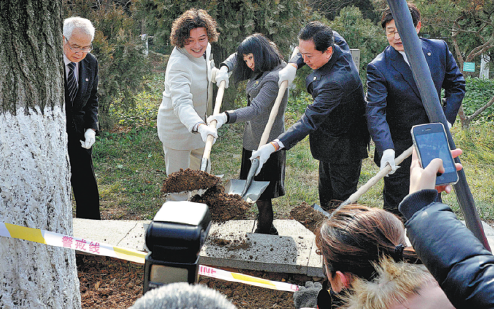After a long, unrelenting battle, all the flowers are about to bloom


Decisive victory
In a recent inspection tour of Jilin province in Northeast China, Xi reiterated the importance of ensuring a decisive victory in building a moderately prosperous society in all respects and eradicating poverty.
The internal conditions and external environment for the country's development were undergoing profound and complex changes, he said.
"We must maintain sustained, healthy economic and social development," Xi said, stressing the need to strengthen study and assessment, deepen research and pursue sound policies.
After some setbacks, China's economy began to recover rapidly from coronavirus shutdowns and started to grow again. The National Bureau of Statistics said the economy grew 3.2 percent in the second quarter, and The Washington Post reported that analysts in Beijing were crowing that the country was "best-in-class at dealing with the pandemic".
In the same article, Julian Evans-Pritchard, a senior economist at Capital Economics, was quoted as saying that with jobs and spending returning and the government trying to stimulate growth, the outlook was good.
"The recovery will inevitably slow down during the second half of the year now that the initial boost from reopening has passed. But… we think GDP will return to its pre-virus trend by the end of the year, faster than in any other major economy."
Semblance of normality
Life in most parts of China has regained a semblance of normality, although temperature checks are required in most buildings and nearly everyone wears a mask. Many businesses require proof of a clean bill of health through a smartphone app before they will allow customers to enter.
Exports also picked up as factories resumed production and the property market began to show some health, which Hatoyama said showed "the resilience of a supply chain system centered around China".
"The size of China's population and the Chinese people's qualities made this possible," Hatoyama said. "In other developing countries, conditions are not always the same, and there is not one way to climb a mountain. However, they have a lot to learn from Chinese model. They can modify it to fit their own course. There is no doubt that China can be a good Sherpa for other developing countries."
In an article titled "Take Targeted Measures Against Poverty", Xi outlined how China could relieve poverty, the message essentially boiling down to boosting the economy to provide job opportunities locally, relocating poverty-stricken people, improving education and enhancing social help for those who have completely or partially lost the ability to work.
"We should encourage all people to work for a better future with their own hands and rely on local resources to end poverty," Xi said. "Those who cannot escape from poverty locally can be relocated year by year in a planned and organized way, and the best way to help the poor is to raise their educational level."
Hatoyama said China is happy to show the world a way of curbing unrelenting, shame-inducing and exhausting extreme poverty. It can do this because it has lifted more people out of poverty than any other country and it was the first to realize the UN Millennium Development Goals.
"When people live so close to the bone, a small setback can quickly spiral into a major trauma and all people should be freed from that fear," Hatoyama said.
However, ending absolute poverty is just a first step, he said, because "eradicating poverty is a never-ending project" in which demographics, environmental degradation and energy scarcity also matter. He himself has been involved in China's endeavor.
"My foundation has planted almost 6 million trees for 20 years in various parts of China," said Hatoyama, who had once planted trees on both sides of the Three Gorges Dam and visited the Guangxi Zhuang autonomous region.
"Visiting Guangxi was a heartwarming experience. I am very pleased to find that all over there is tremendous growth. I will continue to work with people to eradicate poverty and preserve nature.
"President Xi once told me 'Spring has not yet come when you see a single flower blooming. You can say spring has come only after you see every flower blooming.' Improving disparities in society will be the next big challenge for China, as well as for Japan.
"China's growth is, of course, good for it and its people, but I firmly believe it's also good for the rest of the world."
Yukio Hatoyama comes from a prominent Japanese political family. His father served as the country's foreign minister and his grandfather as prime minister.
Hatoyama was prime minister from September 2009 to June 2010. He was the country's first prime minister from the modern Democratic Party of Japan, and he was the first opposition party leader to oust the Liberal Democratic Party from government in decades. Hatoyama, both as a politician and an observer, has long been a keen researcher of China's political and economic development. During his term, the relationship between China and Japan enjoyed a warming period. He has dedicated himself to promoting reconciliation between Japan and China over historical issues. He believes that by learning more about China's poverty alleviation the world can better understand the country.
- China's self-developed technology advances its high-speed railways
- Erhai Lake locals prosper from improved environment
- Doctor injects child with improperly stored drug at Chongqing hospital
- Xi's special envoy attends forum dedicated to Intl Year of Peace and Trust in Turkmenistan
- Memorial ceremony remembers victims of Nanjing Massacre
- Louvre's largest showcase in China goes on display at Museum of Art Pudong in Shanghai




































